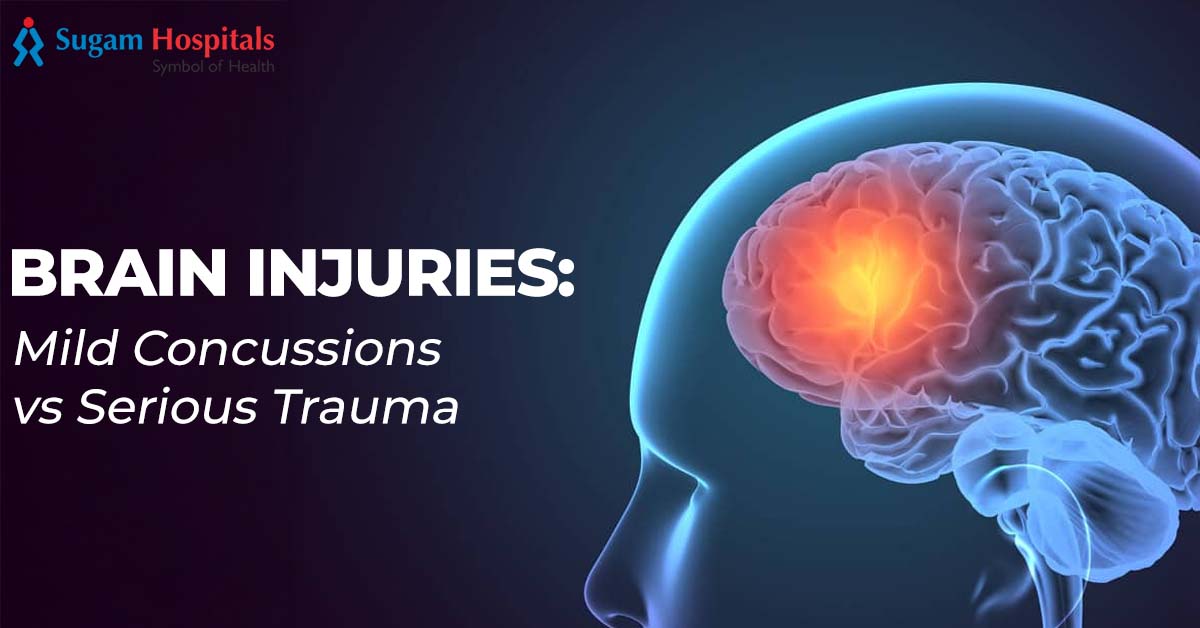Brain Injuries: Mild Concussions vs Serious Trauma

Brain Injuries: Mild Concussions vs Serious Trauma
July 2, 2025 by adminA head injury can seem small but still have serious effects. Some people may have a mild concussion that gets better quickly. Others may face a strong blow to the head that causes serious damage. Knowing the difference between the two helps with better care and recovery. If you ever feel unsure about symptoms, getting help from the best neurologist in Chennai is the safest first step.
What Happens in a Brain Injury?
A brain injury happens when something hits or shakes your head hard enough to affect your brain. It can be from a fall, accident, or sports injury. When this happens, the brain can move inside the skull, which may cause bruising or bleeding.
Doctors usually place brain injuries into two types:
- Mild traumatic brain injury (TBI) or concussion
- Moderate or severe brain injury, where the brain may swell or bleed
What Is a Concussion?
A concussion is a type of mild brain injury. You might not lose consciousness, but you can still have symptoms for a few days or longer. In most cases, concussions go away with rest, but they need attention too.
Common concussion symptoms:
- Headache
- Feeling dizzy
- Blurred vision
- Trouble thinking clearly
- Nausea
- Being bothered by light or sound
- Feeling tired or sleepy
Sometimes these signs don’t appear right away, so it’s important to observe closely.
When Is It More Than Just a Concussion?
If someone loses consciousness for more than a few minutes or shows unusual behavior, it could be a serious brain injury. This type may involve damage to the brain tissues or blood vessels and needs fast medical care.
Warning signs of serious injury:
- Passing out
- Seizures
- Not able to speak clearly
- Weakness in arms or legs
- Repeated vomiting
- Clear fluid from the nose or ears
- Deep sleepiness or confusion
If any of these signs show up, don’t wait, go to a hospital right away.
What Changes Happen Inside the Brain?
When you hit your head:
- Brain cells can get damaged
- Blood vessels may tear
- Brain chemicals might change
Mild injuries often heal, but serious ones may lead to long-term issues.
How Do Doctors Determine the Severity?
Doctors begin by looking at reflexes, memory, balance, and vision. They can also question you to assess how alert you are.
scans like CT or MRI might check for blood or swelling. Not all mild injuries are visible on these scans, so doctors rely on how the patient feels and acts.
How Long Does It Take to Get Better?
Mild concussions often heal in two weeks or less; however, some people will still have symptoms for a longer amount of time. Severe brain injuries may take months or years to heal, and some people may never be able to return to how they were before.
The rate of recovery will depend on the severity of the injury, your age, and the state of your overall health.
Tips on what to do immediately following head injury
When you have a head injury, do the following:
- Allow for a period of rest.
- Avoid phones or screens for a day.
- No driving or sports until the doctor says it is OK.
- Watch for any new or worsening symptoms.
Get care immediately if the affected person becomes confused, vomits, or has trouble speaking or moving.
Long-Term Consequences of Serious Injuries
If a brain injury is severe, it may cause:
- Memory problems
- Mood swings
- Difficulty speaking
- Muscle weakness
- Balance problems
People may need help, such as physical therapy or speech therapy, to improve over time
Is it possible to avoid brain injuries?
Some brain injuries can be avoided. You can help reduce your risk by:
- Wearing a helmet when riding a bicycle or motorcycle.
- Wearing a seatbelt when in a car.
- Keeping the home free of things that may cause you to fall.
- Wearing protective equipment when engaged in sports.
Brain function can be affected by even small bumps to the head. When we talk about mild concussions, we cannot ignore them and serious injuries need to be addressed quickly. Knowing the signs and symptoms and taking action as soon as possible will help minimize any risk involved. If you or someone close to you has suffered a head injury, do not wait, seek medical attention.
At Sugam Hospital we provide quality care for head injuries, Our top cardiologist in Chennai along with neurology Specialist and emergency medicine. Whether a recent accident or an issue that has been going on for a while, we can provide the care and information you need.
Contact Sugam Hospital today for information on head injury management and individualized care for your family.

